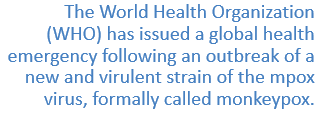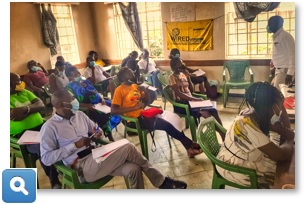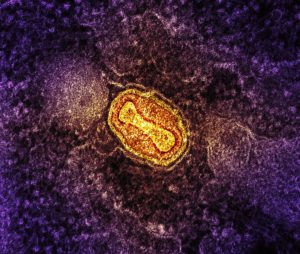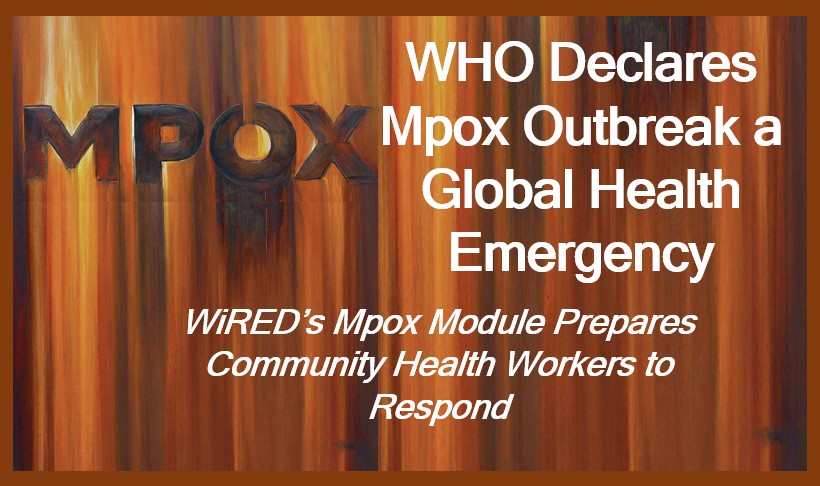By Allison Kozicharow; Edited by Elizabeth Fine
The World Health Organization (WHO) has issued a global health emergency following an outbreak of a new and virulent strain of the mpox virus, formally called monkeypox. Once confined to the Democratic Republic of the Congo (DRC), the infection is now spreading rapidly to an increasing number of countries in Africa, such as Burundi, Kenya, Rwanda and Uganda.
 According to WHO, “Last year, reported cases increased significantly, and already the number of cases [in the DRC] reported so far this year has exceeded last year’s total, with more than 15,000 cases and 537 deaths.”
According to WHO, “Last year, reported cases increased significantly, and already the number of cases [in the DRC] reported so far this year has exceeded last year’s total, with more than 15,000 cases and 537 deaths.”
It is WiRED International’s practice to create a new module for emerging diseases — as we did for Ebola, Zika, COVID-19 and others. We develop training modules early in the advent of a disease in order to prepare CHWs for their possible roles in recognizing and addressing the illness among people in their communities. In June 2022 WiRED released an mpox module after WHO pronounced the virus to be a rising health danger.
 WiRED’s module provides a general introduction to mpox, its emergence, its mode of transmission and its signs and symptoms and demonstrates how to clinically identify mpox and learn about its prevention and control.
WiRED’s module provides a general introduction to mpox, its emergence, its mode of transmission and its signs and symptoms and demonstrates how to clinically identify mpox and learn about its prevention and control.
 Today, WiRED community health workers (CHWs) in Kenya are reviewing the module, both in group sessions and individually, in order to recognize and respond to mpox cases in their populations. Mpox has only recently infected a small number of people in Kenya, but preparing well in advance of an outbreak is a vital part of CHW training. Working directly within the community every day, they are likely to be among the first health workers to recognize the emergence of the virus. This “surveillance” function of CHWs is a critical part of their work.
Today, WiRED community health workers (CHWs) in Kenya are reviewing the module, both in group sessions and individually, in order to recognize and respond to mpox cases in their populations. Mpox has only recently infected a small number of people in Kenya, but preparing well in advance of an outbreak is a vital part of CHW training. Working directly within the community every day, they are likely to be among the first health workers to recognize the emergence of the virus. This “surveillance” function of CHWs is a critical part of their work.
WiRED will continue to post updates on mpox to chart the course of this now urgent international threat and as new information becomes available.
What is mpox?
What is mpox? Mpox is a viral zoonotic infectious disease caused by a virus called Orthopoxvirus. Mpox is transmitted to humans from coming in contact with sores, scabs and oral fluids from infected people (often through sexual relations) and from infected animals, most commonly rodents.
 Characterized by a severe rash, monkeypox can be fatal. Symptoms can be painful and leave permanent scarring from the pox. The disease can cause serious illness or death especially in children under age eight, people with weakened immune systems or a history of eczema and women who are pregnant or breastfeeding.
Characterized by a severe rash, monkeypox can be fatal. Symptoms can be painful and leave permanent scarring from the pox. The disease can cause serious illness or death especially in children under age eight, people with weakened immune systems or a history of eczema and women who are pregnant or breastfeeding.

There are currently two vaccines in use for mpox, and WHO is working with nations, health agencies and vaccine manufacturers to provide immunizations for distribution in low-income countries.


